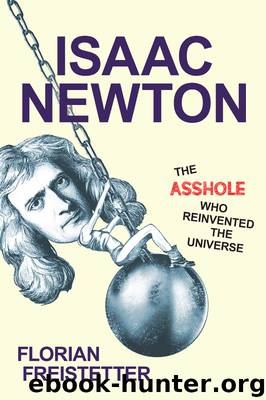Isaac Newton, the Asshole Who Reinvented the Universe by Florian Freistetter

Author:Florian Freistetter
Language: eng
Format: epub
ISBN: 9781633884571
Publisher: Prometheus Books
THE INVENTION OF A NEW LANGUAGE
In order to achieve such a general understanding of nature, Newton first needed a completely new language. Words like “force,” “mass,” “momentum,” “space,” or “time” are clearly defined in the world of science today. But Newton didn't have such definitions at his disposal, and he accordingly faced a struggle when it came to finding clear descriptions. What is a “force” in a physical sense? How can it be demonstrated and how is it measured? Using the official standard unit, the “Newton,” of course, as all schoolchildren learn today in physics classes! But how did this unit come about?
In the notebooks of his youth, Newton wasn't yet decided which word he should use for which meaning: “power,” “efficacy,” “vigor,” “strength,” and other similar terms are used interchangeably. They all have connected meanings, but for a mathematical natural philosophy of the kind Newton wanted to create, he needed clear definitions, not a dictionary of synonyms.
It is precisely with a list of such definitions that Newton's Principia begins. He starts off with mass, defining the mass of an object as the amount of material contained within it, and also explaining that in his definition he has no need for any old “ether” or anything else which might be found between the parts out of which an object is composed. Definition number two in the Principia is concerned with the highly important quality of momentum. Newton calls this “quantity of motion” and explains that it is measured using the speed and size of the material (i.e., the product of the mass and velocity). Of at least equal importance for Newton's physics is the third definition. Here he explains that “inertia” (or vis insita, as he calls it) is the characteristic with which every object works against a change to its current situation (either at rest or in motion). And he uses this definition in order next to establish what a “force” is: namely, an action that is exerted on an object in order to change its state of motion.
If all of that sounds a bit trivial from today's perspective, it just goes to show how much Newton's work has seeped into our very consciousness. Newton had just found his language, and what he had to say with it remains unforgotten by physics even after all these centuries. In the next part of the Principia come the three “laws” or “axioms” that bear Newton's name today and which can be seen as the founding stone upon which modern physics was built.
In their brief and precise choice of words, the three Newtonian axioms are expressed with an almost irresistible elegance:
1. “Every body perseveres [remains] in its state of rest, or of uniform motion in a right [straight] line, unless it is compelled to change that state by forces impressed thereon.”
2. “The alteration [change] of motion is ever proportional to the motive force impressed; and is made in the direction of the right line in which that force is impressed.”
3. “To every
Download
This site does not store any files on its server. We only index and link to content provided by other sites. Please contact the content providers to delete copyright contents if any and email us, we'll remove relevant links or contents immediately.
Waking Up in Heaven: A True Story of Brokenness, Heaven, and Life Again by McVea Crystal & Tresniowski Alex(37641)
Still Foolin’ ’Em by Billy Crystal(36259)
Cecilia; Or, Memoirs of an Heiress — Volume 1 by Fanny Burney(32413)
Cecilia; Or, Memoirs of an Heiress — Volume 3 by Fanny Burney(31824)
Cecilia; Or, Memoirs of an Heiress — Volume 2 by Fanny Burney(31813)
Fanny Burney by Claire Harman(26509)
Empire of the Sikhs by Patwant Singh(22964)
We're Going to Need More Wine by Gabrielle Union(18951)
Hans Sturm: A Soldier's Odyssey on the Eastern Front by Gordon Williamson(18456)
Plagued by Fire by Paul Hendrickson(17314)
Out of India by Michael Foss(16778)
All the Missing Girls by Megan Miranda(15504)
Cat's cradle by Kurt Vonnegut(15156)
Pimp by Iceberg Slim(14326)
Molly's Game by Molly Bloom(14050)
Bombshells: Glamour Girls of a Lifetime by Sullivan Steve(13953)
Leonardo da Vinci by Walter Isaacson(13150)
For the Love of Europe by Rick Steves(12675)
4 3 2 1: A Novel by Paul Auster(12264)
